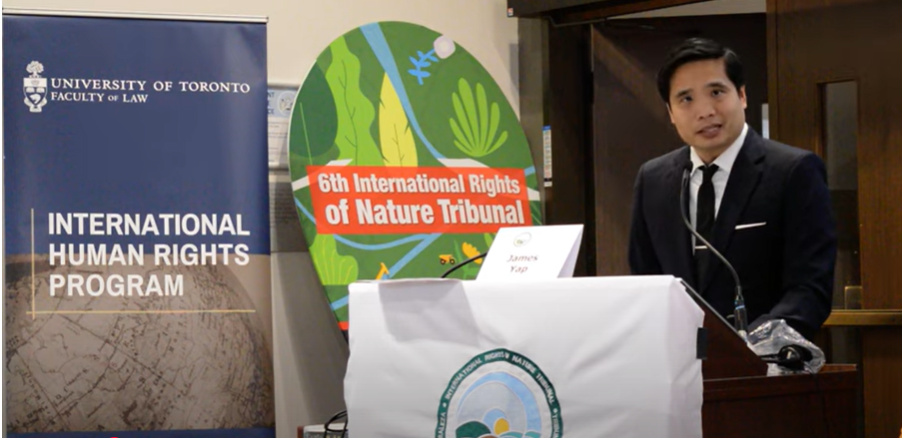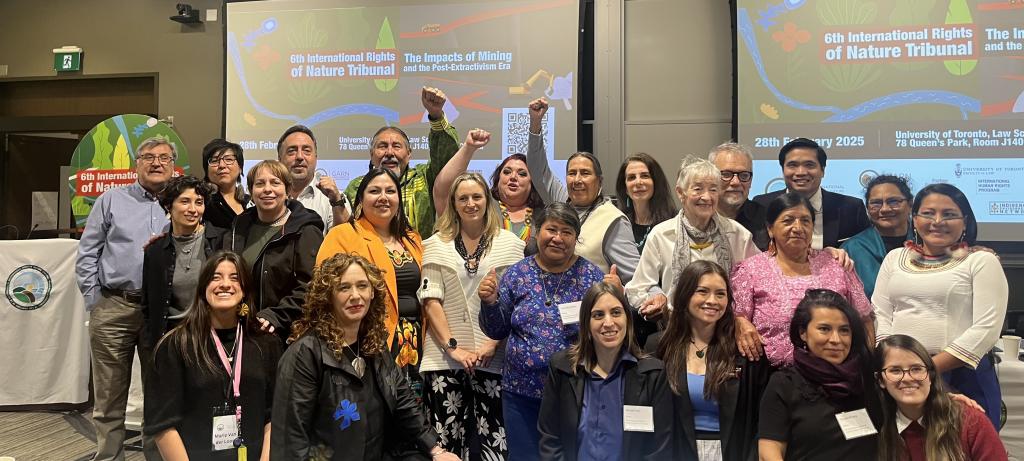Secondary menu
Witnesses Confront Mining Industry at the 6th International Rights of Nature Tribunal: “The Impacts of Mining and the Post-Extractivism Era”

On February 28, 2025, the University of Toronto Faculty of Law hosted the second session of the 6th International Rights of Nature Tribunal, with a focus on the impacts of Canadian mining around the world. This full-day event was hosted by the International Human Rights Program (IHRP) in collaboration with the Global Alliance for the Rights of Nature (GARN), the Environmental Law Club (ELC) at U of T Law, and the International Rights of Nature Tribunal. The session was open to the public and streamed live—drawing attention to the profound environmental and human rights violations perpetrated by Canadian mining companies across the globe—including right here in Canada.
The Tribunal's focus was clear: how Canada's extractive industries—especially mining—continue to wreak havoc on Indigenous lands, ecosystems, and water systems, often with the support or complicity of Canadian banks. In this session, witnesses from around the world traveled vast distances to testify before the tribunal about the devastating impacts their communities have faced from Canadian mining projects.
Testimonies and the Fight for Justice
The Tribunal's Earth Prosecutor, Acting Director James Yap, guided the Judges’ Panel and the audience through harrowing testimonies from frontline defenders, Indigenous leaders, and legal experts who spoke out about the destruction wrought by Canadian extractive companies. The witnesses detailed their lived experiences with environmental degradation, water contamination, and human rights abuses tied to mining operations.
Witnesses passionately presented their cases, illustrating how these Canadian mining companies have not only disrupted ecosystems but also undermined the very fabric of Indigenous communities' cultures and livelihoods. The collective pain of these communities was palpable, and the Tribunal sought to highlight the urgent need for reform in both industry practices and international law.
An expert panel of judges composed of international and Indigenous leaders evaluated witness testimonies, applying the Rights of Nature framework to assess whether these violations meet the criteria for environmental and human rights abuses.
The Verdict
At the conclusion of the day’s deliberations, the Judges delivered the final verdict: the Tribunal found that Canadian mining companies were guilty of violating Collective Rights, Indigenous Rights, and the Rights of Nature in the cases presented. They called for urgent action in response to the widespread violations, including stronger due diligence laws, the recognition of Free, Prior, and Informed Consent (FPIC), and a push to protect critical ecosystems from the devastation caused by Canadian mining operations. They also urged United Nations bodies to investigate the impact of critical mineral extraction on Indigenous peoples and called on governments to enact stronger protections for Indigenous rights, halt ecologically damaging mining projects, and ensure genuine consultation with affected communities.
The Tribunal also emphasized that mining companies must be held accountable not only for the damage caused but also for the criminalization of environmental defenders who speak out against these practices. In addition, it called for immediate financial reparations to be made to the communities impacted by mining and an immediate suspension of destructive projects like Belo Sun in Brazil.
These findings set the stage for further action, including a fact-finding mission to lithium-producing countries in Latin America, where the environmental and human rights impacts of mining continue to unfold.
A Historic Moment
This second session of the 6th International Rights of Nature Tribunal hosted at the University of Toronto Faculty of Law was more than just a hearing—it was a powerful moment in the global movement for environmental justice and the recognition of the Rights of Nature. The testimonies shared were filled with pain, resilience, and hope, which we hope will reverberate in domestic proceedings, international courts, legal frameworks, and communities worldwide.
As the world faces a climate crisis, the importance of protecting the Rights of Nature and addressing the violations perpetuated by extractive industries has never been clearer. The Tribunal’s findings serve as a call to action—a clarion call for governments, corporations, and global institutions to radically shift the way they view and treat the environment, the land, and the Indigenous communities who are its stewards.
 Judges, Witnesses, and Organizers at the Conclusion of 6th International Rights of Nature Tribunal, Second Session
Judges, Witnesses, and Organizers at the Conclusion of 6th International Rights of Nature Tribunal, Second Session
